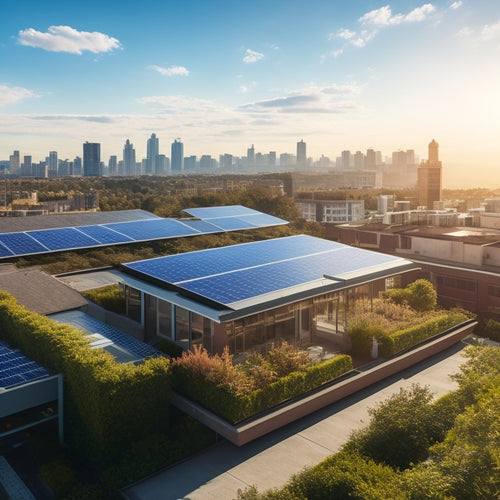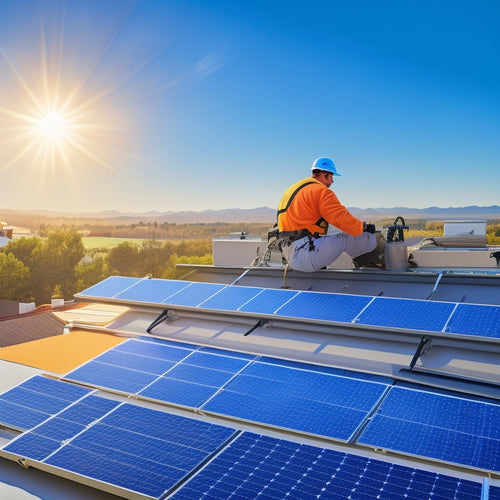
5 Most Efficient Residential Solar Panels for Your Home
Share
You're seeking the most efficient residential solar panels for your home, and with efficiency ratings exceeding 20%, top-rated brands like SunPower, Panasonic, and Tesla offer high-performance options that can considerably reduce your energy bills and carbon footprint. SunPower's X-Series, for instance, boasts an impressive 22.8% efficiency rate, while Panasonic's HIT-240 and Tesla's Solar Roof tiles achieve 21.8% and 20.8%, respectively. To maximize your investment, consider factors like warranties, durability, and installation processes that guarantee seamless integration with your existing electrical system, and investigate how these details can impact your long-term savings.
Key Takeaways
- SunPower's X-Series solar panels offer an impressive 22.8% efficiency rate, making them a top choice for residential use.
- Panasonic's HIT-240 panels provide a high efficiency rate of 21.8%, ensuring maximum energy production for your home.
- Tesla's Solar Roof tiles achieve an efficiency rate of 20.8%, offering a sleek and modern design for your residential solar needs.
- Monocrystalline solar panels, like those from SunPower, offer higher efficiency rates (20-22%) but come at a higher cost, making them a worthwhile investment for some homeowners.
- When selecting the most efficient residential solar panels, look for high-efficiency ratings (exceeding 20%), low temperature coefficients, and durable construction with long warranties.
Top-Rated Solar Panel Brands
When selecting efficient residential solar panels, the brand you choose plays a crucial role in determining the overall performance and reliability of your solar energy system.
You'll want to take into account top-rated brands that offer high-quality products with impressive warranties and dependable customer support. A brand comparison will help you identify the best fit for your specific needs.
Look for brands with a strong reputation in the industry, such as SunPower, Panasonic, and Tesla. These brands offer high-efficiency panels with impressive temperature coefficients and sturdy warranties.
SunPower's X-Series, for instance, boasts an impressive 22.8% efficiency rate, while Panasonic's HIT-240 offers a 21.8% efficiency rate. Tesla's Solar Roof tiles, on the other hand, provide a sleek, integrated design with an impressive 20.8% efficiency rate.
When it comes to installation, think about partnering with a reputable installer who can provide helpful installation tips and guarantee a seamless integration with your existing electrical infrastructure.
High-Efficiency Options Compared
The quest for maximum energy harvesting leads you to high-efficiency solar panels, which boast impressive power outputs despite their compact sizes. You'll find two prominent types: monocrystalline and polycrystalline. Understanding their differences is essential for maximizing energy production.
| Panel Type | Efficiency Range | Cost |
|---|---|---|
| Monocrystalline | 20-22% | High |
| Polycrystalline | 15-18% | Medium |
| Monocrystalline (Premium) | 23-25% | Very High |
| Polycrystalline (Budget) | 12-14% | Low |
Monocrystalline advantages include higher efficiency rates, better low-light performance, and a longer lifespan. However, they come at a higher cost. Polycrystalline comparisons show they're more affordable, but efficiency rates are lower. If budget is a concern, polycrystalline might be the way to go. But if you're willing to invest in maximum energy harvesting, monocrystalline is the better choice. Carefully consider your options to find the perfect balance of power and cost for your residential solar panel system.
Residential Solar Panel Features
Your residential solar panel system's performance relies heavily on its features, which can greatly impact energy production and overall system longevity. When selecting a solar panel system, you'll want to evaluate features that optimize energy output, simplify installation, and guarantee seamless integration with your home's electrical system.
One key feature to look for is advanced solar panel technology, such as bifacial panels that can capture energy from both the front and back sides of the panel. This technology can increase energy production by up to 25%.
You'll also want to examine installation processes that minimize roof penetrations, reducing the risk of leaks and guaranteeing a more secure and efficient installation. Additionally, look for features like built-in inverters, which convert DC power to AC power, and smart monitoring systems that provide real-time performance data.
Panel Efficiency and Durability
High-efficiency solar panels are fundamental to maximizing your residential solar panel system's energy output and reducing your carbon footprint. When selecting panels, look for high-efficiency ratings, typically above 20%. This guarantees you're getting the most power per hour of sunlight.
Additionally, consider the panel's temperature coefficient, which affects its performance in high temperatures. A lower coefficient means the panel will maintain its efficiency even on hot days.
Durability is also important, as you want your system to last for decades. Look for panels with a durable anodized aluminum frame and tempered glass to withstand harsh weather conditions.
A thorough warranty is also essential, providing protection against defects and performance degradation. Opt for manufacturers that offer at least a 25-year warranty on the panel and a 10-year warranty on the inverter.
Proper installation is also key to guaranteeing peak performance and longevity. Follow installation tips such as tilting the panels at the ideal angle, using a sturdy mounting system, and keeping the panels clean to maximize energy output.
Costs and ROI Considerations
How much will it cost to power your home with efficient residential solar panels, and what kind of return on investment (ROI) can you expect?
The upfront cost of solar panels varies depending on factors like panel efficiency, system size, and installation complexity. On average, a 5-kW solar panel system can cost between $15,000 and $25,000. However, with financing options like solar loans and power purchase agreements, you can spread the cost over time.
To maximize your ROI, it's crucial to contemplate installation tips like ideal panel orientation, shading mitigation, and energy efficiency measures. A well-designed system can generate significant savings on your electricity bills, with average annual returns ranging from 10% to 15%.
Additionally, the 30% federal solar investment tax credit (ITC) can help offset the initial investment. With a typical system lifespan of 25 years or more, you can expect a substantial return on your investment over time.
Frequently Asked Questions
Can I Install Solar Panels on My Condo or Apartment Building?
You'll need to review your condo regulations and assess apartment feasibility before installing solar panels, considering factors like roof access, shared walls, and homeowner association rules to determine if it's a viable option for you.
Are Solar Panels Affected by Weather Conditions Like Hail or Snow?
Like a shield, your solar panels stand guard against harsh weather, but hail damage can occur when stones exceed 1 inch in diameter, and snow accumulation reduces energy output by up to 20%, so you'll want to verify your system is designed to withstand these conditions.
Do Solar Panels Increase My Home's Property Value?
You'll likely increase your property value by installing solar panels, as they provide significant resale benefits, with studies showing an average enhancement of $15,000 to $20,000 in value, making your home more attractive to potential buyers.
Can I Use Solar Panels to Charge My Electric Vehicle?
You're wondering if you can utilize the sun's power to fuel your electric vehicle's next expedition. The answer is yes! With solar charging, you can tap into renewable energy, reducing your carbon footprint and saving on fuel costs - a win-win for the planet and your wallet!
Are Solar Panels Compatible With Smart Home Systems?
You'll be glad to know that solar panels seamlessly integrate with smart home systems, enabling advanced automation features like real-time energy monitoring and optimized energy distribution through solar panel integration, elevating your smart home automation experience.
Related Posts
-

What You Need to Know About Permits and Inspections
You need to navigate the complex landscape of permits and inspections to guarantee your project complies with local z...
-

What Is the Cost to Put in Solar Panels
You're likely considering solar panels for your home, and the most significant factor in your decision is the upfront...
-

3 Essential Steps for Solar Electricity Installation
To guarantee a successful solar electricity installation, you'll need to follow three essential steps. First, assess ...


